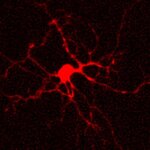Music perception is well preserved in human evolution but the specific biological determinants of music practice are largely unknown.
A study of professional musicians found enhanced activity of genes involved in dopaminergic neurotransmission, motor behavior, learning and memory when they practiced. Several of those up-regulated genes are also known to be responsible for song production in songbirds and that suggests a potential evolutionary conservation in sound perception and production across species, according to the authors.
It is well known that music performance induces…
Neuroscience

Chronic pain is a common complaint affecting millions of people worldwide. Because it is often a non-specific symptom, proper treatment strategies are more like 'keep doing things until something works'.
A new study has identified a cellular mechanism in the brain of mice that contributes to the development of chronic pain, which the authors believe can lead to a novel pharmacological treatment strategy for chronic pain.
Thomas Nevian and
Mirko Santello
from the Department of Physiology at the University of Bern investigated the modification of neurons by chronic pain in a brain…

Do you ever have trouble telling right from left? For example, you’re taking a driving lesson and the instructor asks you to take a left turn and you pause, struggling to think of which way is left.
If so, you’re not on your own – a significant proportion of our population has difficulty in telling right from left.
Left-right discrimination is a complex neuro-psychological process involving several higher neurological functions such as the ability to integrate sensory and visual information, language function and memory. For some it is second nature but for others a considerable challenge.…

Mention the terms “intellectual giftedness” and “learning disability” and there is a general understanding of what each term means. However, most people are unaware that in many circumstances the two can go hand in hand.
Current US research suggests that 14% of children who are identified as being intellectually gifted may also have a learning disability. This is compared to about 4% of children in the general population. No-one has been able to explain this discrepancy.
While children who are intellectually gifted are acknowledged, the fact that some of these students could also have a…

When we look at a known word, our brain sees it more like a picture than a series of letters needing to be processed, according to a new paper in the Journal of Neuroscience.
Neurons respond differently to real words, such as turf, than to nonsense words, such as turt, showing that a small area of the brain is "holistically tuned" to recognize complete words, says the study's senior author, Maximilian Riesenhuber, PhD, who leads the Georgetown University Medical Center Laboratory for Computational Cognitive Neuroscience.
The brain learns words quickly by tuning neurons to respond to a…

Patients with carpal tunnel syndrome are more than twice as likely to have migraine headaches, according to data derived from nearly 26,000 Americans responding to a national health survey. Among other questions, participants were asked whether they had had carpal tunnel syndrome during the past year or "severe headache or migraine" during the past three months.
Patients with carpal tunnel syndrome have symptoms such as hand numbness and weakness, resulting from pressure on the median nerve in the wrist.
The association also runs in the other direction, with migraine patients having…
Each day we are bombarded with branding and repetitive advertising. Is it feasible that we dutifully soak up visuals and messages and store them accurately?
An experiment tested the concept by examining our memory of the ubiquitous Apple logo and our perceived ability for recall.
Apple has long been a logo recognized the world over and now it is riding a wave of unparalleled fan adulation, with people standing in line for hours just to overpay for phones, tablets and watches and the aesthetic self-identification the logo brings.
With so much visibility, surely we stand a good chance…

Epilepsy is a neurological disorder that affects approximately two percent of the population.
Despite extensive research and breakthroughs, one-third of patients are resistant to currently available therapies. A team of researchers as discovered a new cause to explain the development of temporal lobe epilepsy and may lead to future treatments: At an early stage, astrocytes are uncoupled from each other.
This results in the extracellular accumulation of potassium ions and neurotransmitters, which cause hyperexcitability of the neurons.
In the tissue of patients with temporal lobe…
A new study finds that even a brief nap can significantly improve memory retention of learned material.
Saarland University
graduate student Sara Studte, PhD supervisor Axel Mecklinger and co-researcher Emma Bridger have examined how power naps influence memory performance.
In their study, memory performance did not improve in the nap group relative to the levels measured immediately after the learning phase, but they remained constant. The control group, whose members watched DVDs while the other group slept, performed significantly worse than the nap group when it came to remembering the…

Speech problems in early childhood are common. One in four parents of Australian children are concerned about their 4- to 5-year-old child’s speech but two-thirds of these parents don’t act on their concern.
Why? What might stop them from seeking expert advice from a speech pathologist?
Myth 1: Children grow out of speech problems (just look at Einstein!)
It is true that children’s speech development takes time. A young child does not pronounce words like “spaghetti” or “hospital” accurately the first time they say them. However, parents should not hold onto the idea that their child will…